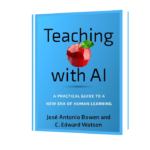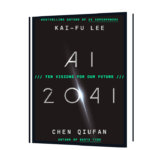Generative Artificial Intelligence: What Everyone Needs to Know by Jerry Kaplan provides an insightful exploration into the transformative impact of generative AI on society, technology, and the future of human-machine interaction. While I can’t access the text directly, I can outline key themes and offer an in-depth discussion on the significance of AI, particularly generative AI, in various fields and aspects of our lives.
The Transformative Power of Generative AI
Generative AI, unlike traditional AI, creates new content, ranging from text, images, and audio to entire videos, often by learning from existing data. This capability opens up vast potential in fields like media, entertainment, education, healthcare, and more. Generative models, such as GPT (Generative Pre-trained Transformer) and DALL-E, have demonstrated impressive capacities to produce human-like text and high-quality images based on textual prompts, significantly advancing fields like natural language processing and computer vision.
Importance of AI in Key Areas
1. Revolutionizing Creative Industries
- Content Creation: Generative AI allows writers, designers, and artists to generate ideas, draft content, and even produce art. This is particularly useful in marketing and media, where high volumes of quality content are needed. For example, platforms can now generate ad copy, social media posts, or product descriptions within seconds, streamlining creative workflows.
- Media and Entertainment: The film and gaming industries are using AI to generate visuals, scripts, and even entire scenes. With advances in deepfake technology, AI can create realistic representations of people, allowing actors to “appear” in scenes they never filmed. While this raises ethical concerns, it also presents creative opportunities for virtual reality, simulations, and immersive experiences.
2. Enhancing Education and Learning
- Personalized Learning: AI can provide custom-tailored learning experiences, adapting to each student’s pace and style. For instance, generative models can create quizzes, summaries, and tutorials on demand, making learning more efficient and engaging.
- Tutoring and Assistance: AI-powered tutors can support students around the clock, answering questions and clarifying complex concepts in natural language. This accessibility expands educational opportunities, particularly in regions with limited educational resources.
- Content Generation for Educators: Generative AI can help educators by creating instructional materials, tests, and even lecture notes, enabling them to focus more on teaching and less on preparatory tasks.
3. Transforming Healthcare
- Medical Imaging and Diagnosis: Generative AI is being applied to medical imaging to improve diagnosis accuracy. By analyzing vast datasets of medical images, AI models can help identify early signs of diseases like cancer, often with a level of precision that surpasses human capabilities.
- Drug Discovery: Generative models can simulate molecular structures and predict interactions, accelerating drug discovery processes. This reduces the time and costs involved in developing new medications and has the potential to improve patient outcomes by quickly identifying effective treatments.
- Personalized Medicine: By analyzing genetic information, AI can recommend treatment plans tailored to an individual’s unique genetic makeup. Generative AI assists in predicting how patients will respond to various treatments, promoting a more personalized approach to healthcare.
4. Boosting Business and Innovation
- Data-Driven Decision Making: Generative AI can analyze and synthesize large datasets, helping businesses make informed decisions by identifying patterns, trends, and potential market shifts.
- Automation and Efficiency: In customer service, AI-powered chatbots can handle routine inquiries, freeing up human employees for more complex issues. AI also streamlines workflows in industries like logistics, manufacturing, and finance by predicting demand, optimizing supply chains, and reducing operational costs.
- Product and Service Innovation: Generative AI enables companies to innovate by creating new products and services. For example, AI can design prototypes, create virtual models, and simulate testing, accelerating the development cycle and encouraging experimentation.
5. Advancing Science and Research
- Scientific Discovery: In scientific research, AI models analyze large datasets from experiments, simulate physical phenomena, and identify patterns that might not be obvious to human researchers. For instance, in fields like particle physics and climate science, generative models aid in simulations and data interpretation.
- Language Translation and Preservation: AI language models support multilingual research by translating complex texts, making knowledge more accessible across language barriers. They also assist in preserving endangered languages by learning and reproducing linguistic patterns, helping to maintain cultural heritage.
- Enhanced Collaboration: AI facilitates collaboration by generating summaries of research, extracting key points, and organizing information. Researchers can focus on exploring insights rather than spending time on administrative or repetitive tasks.
Ethical Considerations and Challenges
While generative AI holds immense potential, it also brings several ethical and practical challenges:
Bias and Fairness: Generative models are trained on large datasets that often contain biases from historical data, which can lead to biased outcomes. For instance, AI could inadvertently reinforce stereotypes or exclude marginalized voices, raising concerns about fairness and inclusivity.
Privacy Concerns: As AI systems rely on vast amounts of data, privacy issues arise regarding data collection and usage. AI could unintentionally reveal sensitive information, highlighting the need for strict data governance policies to protect user privacy.
Job Displacement and the Future of Work: Automation through AI could displace jobs in sectors like customer service, data entry, and manufacturing. While it creates opportunities for new types of jobs, it also requires a societal shift to address potential unemployment and reskilling needs.
Intellectual Property and Authorship: The rise of AI-generated content challenges traditional notions of authorship and intellectual property. For example, if an AI creates an artwork, who holds the copyright? These questions are shaping new legal frameworks and guidelines.
Deepfakes and Misinformation: Generative AI can create highly realistic deepfakes, which can be used maliciously to spread misinformation. This raises concerns about trust, as it becomes harder to distinguish between real and fake information. Addressing this issue requires technological solutions, regulatory frameworks, and public awareness.
Looking to the Future: The Path Forward
For AI to fulfill its potential responsibly, several key areas need ongoing attention:
Transparency and Explainability: AI models must become more interpretable to allow humans to understand and trust their outputs. Research into explainable AI (XAI) aims to make the decision-making processes of AI systems more transparent.
Ethical AI Development: AI ethics must be a core consideration for developers, with frameworks that prioritize fairness, accountability, and inclusivity. This includes ensuring diversity in the teams designing AI systems and implementing measures to detect and mitigate bias.
Regulation and Standards: Governments and international bodies are working to establish regulations for AI, addressing concerns about misuse, safety, and privacy. Clear standards are essential to ensure AI is developed and used responsibly.
Collaboration Between Humans and AI: Rather than viewing AI as a replacement for human work, a collaborative approach is more sustainable. By integrating AI tools that enhance human creativity, judgment, and problem-solving, society can build a future where humans and machines complement each other’s strengths.
Conclusion
The importance of generative AI lies not just in its ability to create but in its potential to reshape industries, enhance productivity, and solve complex global challenges. Its impact on fields like education, healthcare, business, and research exemplifies its transformative potential. However, with great power comes great responsibility. Society must navigate the ethical and practical challenges of AI, balancing innovation with caution to ensure that AI remains a force for good.
As Kaplan’s book likely discusses, the future of generative AI will be defined by the choices we make today. By embracing a thoughtful and ethical approach to AI development, we can harness this technology to improve lives, drive progress, and address some of humanity’s greatest challenges.







